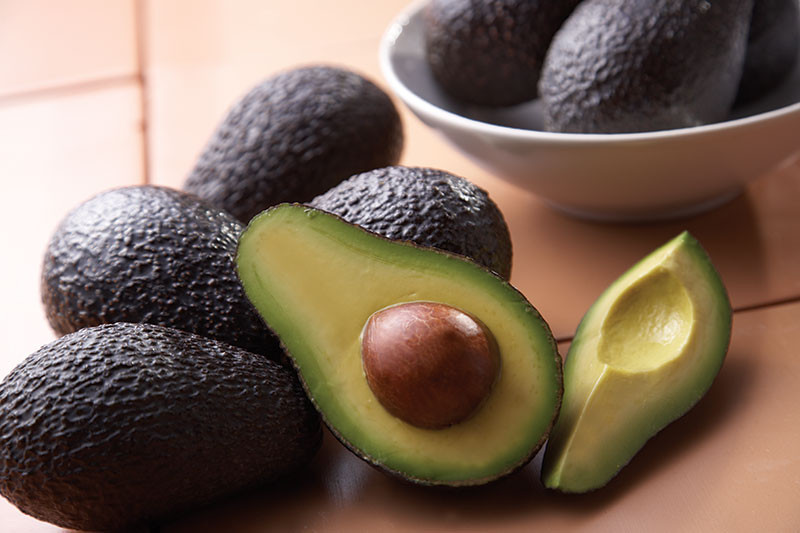
Avocados protect the heart with their fiber, oleic acid, and potassium. Eaten with healthy fats, they can lower the bad LDL levels by 13.5 mg/dl and aid in weight loss. Toss them with colorful veggie salads to get more eye-protective antioxidants. As avocados fight inflammation, they can be added to diets for atherosclerosis, early-stage Alzheimer’s, arthritis, and cancer. Eat 50 g avocado flesh a day, scraped close to the peel.
The avocado has fast become a main player on menus frequented by the health-conscious. So what makes this gorgeously green fruit such a hit? Well, it’s not only packed with fiber and antioxidants but also anti-inflammatory oleic acid and heart-healthy minerals like potassium1 – and that’s just the beginning of the long list of benefits of avocados.
1. Is Good For Your Heart
There are multiple nutrients in avocados that make them the one fruit for your heart.
Avocado fiber reduces blood pressure, balances the cholesterol levels, and improves the body’s sensitivity to insulin. Every 100 g of the fruit contains 6.7 g fiber.2 3
Avocados are a high-calorie and high-fat fruit. But most of the carbs are in the form of heart-healthy fiber, and the fats are not just healthy but essential too.
Oleic acid, a monounsaturated fatty acid (MUFA) in avocados and olive oil, help the heart by making the body more sensitive to insulin and using glucose properly. It also arrests the progress of atherosclerosis in blood vessels – atherosclerosis is a dangerous condition where the blood vessels are clogged by fat deposits which hinder blood flow.4
Avocados have more potassium than sodium, which is good news for the heart since potassium lowers blood pressure, while sodium raises it. Every 100 g avocado has 485 mg potassium and 7 mg sodium. Potassium is also important for normal heart function as it aids skeletal and smooth muscle contraction.5 Having more potassium can actually help patients of high blood pressure and lower the risk of strokes by 24%.6
2. Reduces Bad Cholesterol
High cholesterol is a dangerous condition that raises your risk for several diseases, including heart attacks. But not all cholesterol is bad. While LDL cholesterol is harmful, HDL cholesterol is actually good for your health. It also helps remove the extra LDLs. People with high cholesterol also have a fat called triglycerides, too much of which is also a red flag.
Don’t skimp on fat. Eat heart-healthy fats like tuna and almonds and add half an avocado to the meal.
Though a fatty fruit, avocados can raise the HDL levels and reduce the LDLs and triglycerides in people who have abnormal lipid profiles – that is cholesterol and triglyceride counts.7 In fact, one small study on overweight and obese participants (overweight is often a sign of abnormal lipid levels) found that
- a moderate-fat diet with avocados lowered LDL cholesterol by 13.5 mg/dl
- a moderate-fat diet without avocados lowered LDL cholesterol by 8.3 mg/dl
- a low-fat diet that didn’t consist of avocados lowered LDL cholesterol by 7.4 mg/dl8
What this shows is that not only should you have heart-healthy fats, like in fish, you should also add avocado to your daily diet.
3. Reduces Inflammation In The Body
A study found that when participants ate 68 g avocado with a hamburger, there was less inflammation than when they ate the hamburger alone.9 It may even help patients in the early stages of Alzheimer’s by reducing inflammation-related damage caused by beta-amyloid peptides, the culprit responsible for the nerve-degenerating condition.10
These anti-inflammatory benefits can be attributed to oleic acid and antioxidants like carotenoids, polyphenols, and tocopherols. One Japanese study found that levels of high-sensitivity C-reactive protein (CRP), an inflammatory marker in the body, was inversely related to oleic acid intake.11 Even in patients of Alzheimer’s disease, oleic acid can also reduce
4. Prevents Arthritis And Reduces Pain
The anti-inflammatory benefits of avocados extend to patients of osteoarthritis too. Osteoarthritis is a painful inflammatory condition in the joints. The Arthritis Foundation suggests eating avocados if you have osteoarthritis as the oleic acid, the carotenoid lutein, and vitamin E – all which have anti-inflammatory effects – can help alleviate symptoms. As the foundation explains, a diet high in these nutrients has been associated with lower risk of joint damage characteristic of early-stage osteoarthritis.12
Avocado-soybean unsaponifiables (ASU) can reduce inflammation and pain effectively and check further degeneration of cartilage.
In one study, avocado-soybean extract was found to be effective when treating patients with symptomatic hip osteoarthritis.13 This all-natural extract known as avocado-soybean unsaponifiables (ASU) is made by combining 1 part of avocado oil with 2 parts of soybean oil. It helps block inflammation, reduces degeneration of cells that line your joints, and could even regenerate normal connective tissue. It also helps reduce pain better than painkillers.14
5. Protects The Eyes
Add avocado or avocado oil to your colorful salads to absorb the eye-protective carotenoids better.
Abundant in avocados, the antioxidant carotenoids are great for your eyesight. Beta-carotene is in fact a precursor of vitamin A. Studies have found that not getting enough lutein through your diet could cause age-related eye dysfunction. But diets rich in monounsaturated fatty acid have a protective effect against this dysfunction. Avocados, in particular, are spotlighted because the bioavailability of lutein/zeaxanthin in them is higher than in most other vegetables and fruits. This is because carotenoids are better absorbed by the body when mixed with MUFAs.15 This is why adding avocados to your rainbow salads is a great idea.
6. Prevents And Fights Cancer
So far, only a few studies have tested avocado’s ability to prevent and fight cancers like prostate cancer, acute myeloid leukemia (a cancer of the blood and the bone marrow), and oral cancer by inducing death in cancer cells.
Avocados have been proven to fight prostate, oral, and blood and bone marrow cancer (AML) effectively.
But several studies on the bioactive substances like oleic acid, avocatin B, vitamin E, lutein, beta-carotene, alpha-carotene found in the fruit show that avocados could help with other cancers too. These compounds help inhibit the growth of precancerous and cancer cell lines, induce cell death (apoptosis) of abnormal cells, and also arrest the cell cycle.
Dietary vitamin E and lutein are linked with a decrease in the risk of breast cancer even in women with a family history of breast cancer,19 while the carotenoids can prevent oral cancers. Oleic acid is also known to reduce cancer risk by reducing inflammation.20
In addition, the phytochemicals could have potential use in reducing the side effects of chemotherapy.21
7. Helps In Weight Loss
The weight loss effect of avocados is beyond debate. About 80% of an avocado’s carbohydrates come from fiber. Of this, about 70% is insoluble and 30% soluble.22 Fiber can keep you full longer and help you restrict calorie intake. Fiber also helps avoid those sudden dips or spikes in sugar or energy levels that can lead you to make unhealthy food choices.23 Also, the high fiber content in avocados prevents constipation by promoting easier bowel movements.
People who eat avocados have been seen to eat healthier, work out better, and have lower waist sizes. Not a coincidence!
Strange but true, people who eat avocados also seem to eat healthier and work out better.24 25 They also improve the way your body uses or stores glucose, thus lowering your BMI.26 27
8. Promotes Skin Health
With 63% oleic acid, avocado is an excellent source of skin care. When applied topically, avocado eases inflammation, heals wounds, and helps cell regeneration. It can even heal psoriasis or eczema. Its fatty alcohol and vits C and E check UV damage and skin cancer and help repair DNA. With its antioxidants fighting free radical damage and vits, fats, and plant chemicals fortifying the skin’s collagen, avocados keep your skin supple and youthful. Avocado oil is helpful in people trying to lose weight or in those having high cholesterol.
9. Nourishes The Fetus
Eating avocados during pregnancy provides vital nutrients. An avocado (130 g) a day meets 30% of your folate need for a stronger spine, skull, and brain of the fetus. This high-potassium, low-sodium fruit prevents leg cramps. It also packs in good doses of phosphorus, calcium, iron, and magnesium. As it helps absorb carotenoids better, by 15.3 times, even, toss it into salads and add its oil to salsa to keep your carotenoid levels high. Avocado oleic acid also enriches breast milk.
10. Provides Nutritional Support To Babies
Avocados provide necessary nutrition to babies required for their growth. More nutritious than an apple or a banana, even 1/4 of an avocado can give a 7- to 12-month baby a healthy bowel. A half can meet 100% of her folate and 86% of vitamin B6 requirement. Being a complete source of protein, it has the 10 essential amino acids a baby needs from food and also has minerals like potassium and magnesium. However, give your baby avocado puree only after she crosses 6 months.
Eat 50 g Avocado Flesh Daily
In 2016, the US Food and Drug Administration (FDA) increased the serving size of an avocado from one-fifth of a medium-sized fruit to one-third. That’s the equivalent of about 50 grams of the fruit, which can give you 10 percent of your daily folate requirements and 11 percent of your daily value of fiber. It also gives you 6 grams of healthy fats, 135 micrograms of lutein/zeaxanthin, and a healthy dose of potassium and vitamins C and E.28 A third of a cup of avocado has around 80 calories, making it a fairly calorie-rich food.29 This means you need to pay special attention to your serving size – it’s easy to eat too much!
Eat Avocados Fresh And Raw
The best way to consume an avocado is when it’s nice and fresh. Scrape the flesh as close to the peel as you can since avocado peel has more helpful nutrients. Consumption of avocado seed decoction is believed to treat diabetes, diarrhea, kidney stones, and even snakebite. The avocado leaf has more protein, fiber, minerals, and phytochemicals than the fruit, and can prevent convulsions, lower the blood glucose level, fight ulcer with its antioxidants, and lower body weight by burning fat stored in adipose tissues.
Avocados taste best eaten fresh and raw in a salad or used as a dip or spread. Or whip up a delicious avocado smoothie with a base of milk or dairy substitutes like nut or rice milk. This sure is one of the popular ways to drink up its goodness!
You could also juice an avocado, though you could end up consuming more calories than you want to. A cup of the juice requires multiple cups of the actual fruit. However, blending a serving of avocado into a smoothie with other low-calorie fruits and vegetables is a great and satisfying option.
Heating avocado can ruin its flavor, so don’t cook it. Also, remember, exposure to air can quickly oxidize the nutrients, so if you intend to eat more of your avocado later, a protective squeeze of lemon juice may help.
Don’t Overeat
Avocados are a good addition to any diet, provided you don’t go overboard. If you are calorie-counting, avocados can eat heavily into your daily caloric allowance. And while its good fats are great to have, be sure to compensate by cutting down on fats from other food sources.

You can check out the latest casting calls and Entertainment News by clicking: Click Here
Click the logo below to go to the Home Page of the Website
Click the logo below to follow ETInside on Twitter
Click the logo below to follow ETInside on Facebook
Click the logo below to follow ETInside on Instagram
Click the logo below to follow ETInside on Pinterest
Click the logo below to follow ETInside on Medium











